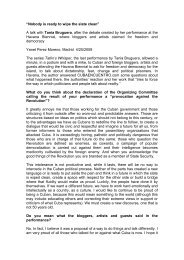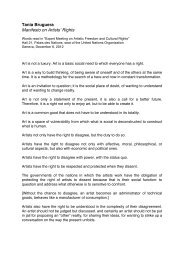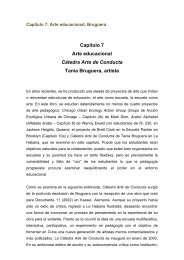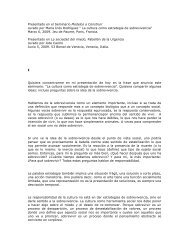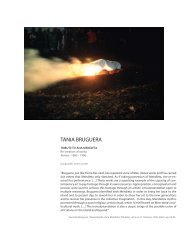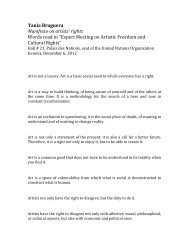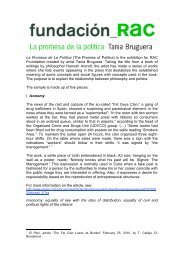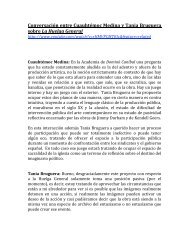Download PDF - Tania Bruguera
Download PDF - Tania Bruguera
Download PDF - Tania Bruguera
Create successful ePaper yourself
Turn your PDF publications into a flip-book with our unique Google optimized e-Paper software.
7. The student-coordinated raid on Radio Reloj<br />
(Clock Radio) was part of a plot to assassinate<br />
Fulgencio Batista. See Elvis Fuentes, ‘A Timely<br />
Introduction’, in Killing Time: An Exhibition of<br />
Cuban Artists from the 1980s to the Present (Exit Art:<br />
New York, 2008), p. 7. On Castro’s calendar, see<br />
Nicola Miller, ‘The Absolution of History: Uses<br />
of the Past in Castro’s Cuba’, Journal of<br />
Contemporary History, vol. 38, no. 1, January 2003,<br />
pp. 147–62.<br />
8. Reinhardt Koselleck, Futures Past: On the<br />
Semantics of Historical Time, trans. by Keith Tribe<br />
(MIT Press: Cambridge, MA, 1990), pp. 49–57.<br />
9. Castro, ‘History Will Absolve Me’, in Fidel<br />
Castro: The Havana Declarations (Verso: London,<br />
2008), p. 78.<br />
10. Jo Thomas, ‘The Last Days of Castro’s<br />
Cuba’, New York Times, ,http://www.nytimes.<br />
com/1993/03/14/magazine/<br />
the-last-days-of-castro-s-cuba.html. (accessed 5<br />
January 2010).<br />
<strong>Tania</strong> <strong>Bruguera</strong>: Between Histories<br />
Fig. 2. <strong>Tania</strong> <strong>Bruguera</strong>, Tribute to Ana Mendieta. Exhibited at Ana Mendieta/<strong>Tania</strong> <strong>Bruguera</strong>. Sala<br />
Polivalente, Centro de Desarrollo de las. Artes Visuales, Havana, Cuba (1992). Conception year: 1985.<br />
Implementation years: 1986–1996. Medium: re-creation of works. Duration: long-term project.<br />
Materials: Ana Mendieta’s artworks and unrealised projects, lectures, exhibitions, interviews, texts.<br />
(Courtesy: Studio <strong>Bruguera</strong>. Photos: #Gonzalo Vidal Alvarado.)<br />
(Tribute to Ana Mendieta), as the series of re-performances came to be known,<br />
re-scripted the dislocations of the 1980s. Like the Cuban government,<br />
<strong>Bruguera</strong> too screwed with history.<br />
Screwing with history is a staple of Cuba’s revolutionary culture. In March<br />
1957, a group of students raided Radio Reloj and stopped the clocks, and,<br />
on 1 January 1959, Castro turned back the calendar. 7 Taking his lead from<br />
the Jacobins, who had revised the Christian calendar in accordance with the<br />
revolutionary events of 1789, Castro declared 1959 Year 0 and triumphantly<br />
recouped history. History, in revolution, though, does not simply begin anew<br />
or start over. Breaking with Christian eschatology or the expectations of the<br />
imminent arrival of doomsday, revolutions, as Reinhardt Koselleck has<br />
argued, mark a qualitative change in the nature and movement of time. 8<br />
Revolutionaries stop the clocks and rewrite the calendar in order to re-script<br />
the past according to the future. In Cuba, this re-scripting was nowhere<br />
more evident than in the famous closing line of Castro’s four-hour<br />
self-defence of the charges brought against him in 1953 for orchestrating<br />
the Revolution. Establishing a lineage between his Revolution and the Cuban<br />
Independence Army’s fight for independence from Spain, Castro triumphantly<br />
concluded: ‘Condemn me. It does not matter. History will absolve me.’ 9<br />
To screw with history in 1992 may have been somewhat of an empty gesture.<br />
By most accounts, that year proved that history had not ‘absolved’ Castro and<br />
that the Revolution was already over. Although the political and economic<br />
upheavals of 1989 did not result, to borrow a headline from the New York<br />
Times, in ‘The Last Days of Castro’s Cuba’, Cubans did experience a seismic<br />
shift in the island’s economic and political culture at the start of the 1990s. 10<br />
In 1991, the island lost its main trading partner, the Soviet Union; in 1992,<br />
it lost, so to speak, ‘everyone else’. In an effort to compound the crises<br />
caused by the closures of the Eastern Bloc markets and to force regime<br />
change, the US Congress passed the Torricelli Act, also known as the Cuban<br />
OXFORD ART JOURNAL 35.2 2012 219



